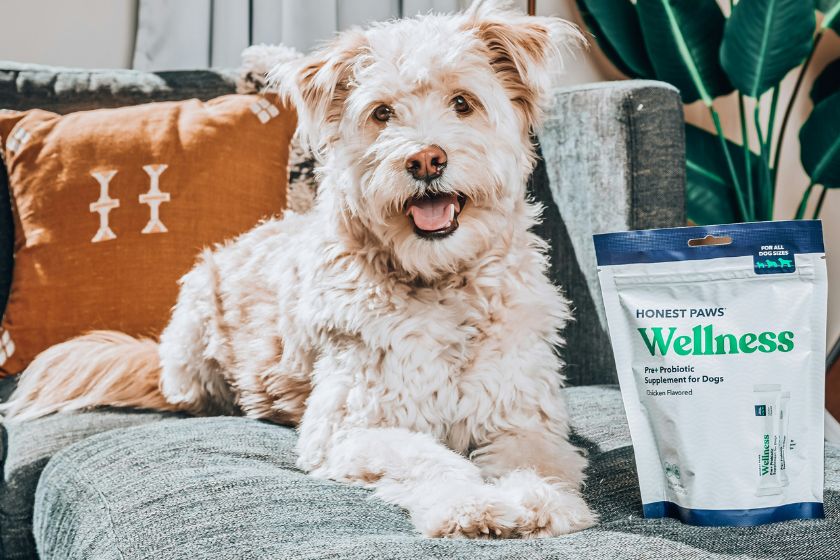
Probiotics for dogs are becoming an increasingly popular topic among pet owners who want to support their furry friends’ health. These beneficial bacteria and yeasts help maintain a balanced gut microbiome, which can contribute to better digestion, immune function, and overall well-being. In this guide, we’ll explore what probiotics do for dogs, why they’re important, and how to choose the best probiotics for dogs.
What Do Probiotics Do for Dogs?
Probiotics are live microorganisms that provide health benefits when consumed in adequate amounts. In dogs, they work primarily by supporting the digestive system. The gut plays a crucial role in a dog’s health, as it houses a large portion of the immune system and plays a part in nutrient absorption.
When a dog’s gut flora is imbalanced—due to factors like poor diet, stress, illness, or antibiotics—probiotics can help restore this balance. Probiotics for dogs have a variety of health benefits, including:
- Digestive Health: Probiotics can help regulate your dog’s digestive system, reducing symptoms of diarrhea, constipation, and bloating.
- Immune Support: By supporting the gut’s lining and promoting beneficial bacteria, probiotics can strengthen the immune system and help prevent infections.
- Healthy Skin and Coat: A balanced gut can impact a dog’s skin health. Some dog owners notice improvements in their pet’s coat after introducing probiotics.
- Relieving Food Sensitivities: Probiotics can aid in reducing the impact of food sensitivities, especially when combined with a healthy diet.
Why Should You Consider Probiotics for Your Dog?
Probiotics can offer several advantages, especially if your dog experiences digestive issues or is recovering from an illness. Here are some specific situations when probiotics may be particularly helpful:
- Digestive Problems: Dogs suffering from gastrointestinal disturbances like diarrhea, vomiting, or constipation can often benefit from probiotics. They work to restore the balance of good bacteria in the gut, helping to resolve digestive discomfort.
- Antibiotic Use: If your dog has been prescribed antibiotics, probiotics can help replenish the healthy bacteria that antibiotics often deplete, reducing the risk of gastrointestinal upset.
- Dietary Changes: When switching to a new food or transitioning from puppy to adult dog food, probiotics can ease the transition and reduce the likelihood of digestive issues.
- Stress or Travel: Just like humans, dogs can experience digestive issues when stressed, especially during travel. Probiotics can help soothe the gut and promote overall balance during these times.
Choosing the Best Probiotics for Dogs
Not all probiotics are created equal. When selecting the best probiotics for dogs, it’s essential to consider the strain of bacteria, the product’s quality, and the dosage. Here are some tips for choosing the right probiotic for your dog:
Look for Proven Strains
Certain strains of probiotics are better suited for dogs than others. Some of the most commonly used and well-researched strains for dogs include:
- Lactobacillus acidophilus: This strain helps regulate gut health and supports the immune system.
- Bifidobacterium animalis: Known for its ability to maintain digestive balance, this strain is commonly found in dog-specific probiotic supplements.
- Enterococcus faecium: This probiotic strain helps support digestive health and has been shown to be beneficial in treating diarrhea and other gut-related issues.
Make sure to choose a product with a strain proven effective for dogs. Always check the label to confirm the probiotic strains included.
Choose a High-Quality Supplement
The quality of probiotics can vary greatly between brands. Look for probiotics that are specifically formulated for dogs, as human supplements may not be suitable. Trusted brands often perform rigorous testing to ensure that their products contain the correct amount of live bacteria at the time of consumption.
Additionally, choose a product with a clear shelf life and proper storage instructions, as probiotics can lose their effectiveness over time if not stored correctly.
Check the Dosage
The dosage of probiotics for dogs depends on the size of your pet and the specific product you’re using. Generally, smaller dogs need a lower dose, while larger dogs will need more. Be sure to follow the instructions on the packaging and consult with your veterinarian for the proper dosage.
Some products come in powder, capsule, or chewable forms. If you have a picky eater, you might prefer a tasty chew or powder that can be mixed into your dog’s food.
Probiotics and Your Dog’s Diet
While probiotics are an excellent addition to your dog’s diet, they should complement—not replace—a balanced and nutritious food plan. High-quality, whole-food ingredients like protein, healthy fats, and fiber should form the foundation of your dog’s meals. Probiotics can help optimize digestion and nutrient absorption, but they won’t fix a poor diet.
If you’re looking for high-quality dog food options, consider including food brands that already incorporate probiotics into their formulas for an added benefit. Also, always consult your vet before introducing any new supplements into your dog’s routine.
Potential Side Effects of Probiotics for Dogs
Probiotics are generally safe for dogs when used correctly. However, in some cases, they can cause mild digestive upset, especially if you introduce them too quickly or give your dog too much at once. Signs of mild side effects may include bloating, gas, or soft stools.
If you notice any adverse effects, it’s best to reduce the dosage or discontinue the supplement and consult your veterinarian. Your vet can help determine the best course of action for your dog’s health.
Probiotics are an excellent tool for supporting your dog’s digestive health and overall well-being. Whether you’re dealing with digestive issues, recovering from illness, or looking to enhance your dog’s daily nutrition, probiotics can offer valuable support. By choosing the best probiotics for dogs and understanding their benefits, you can give your dog the optimal care they deserve.
For more expert advice on maintaining your dog’s health, check out other resources at Small Batch Dog Food. Our commitment to providing quality nutrition advice and expert insights will help ensure your furry friend leads a happy, healthy life.



